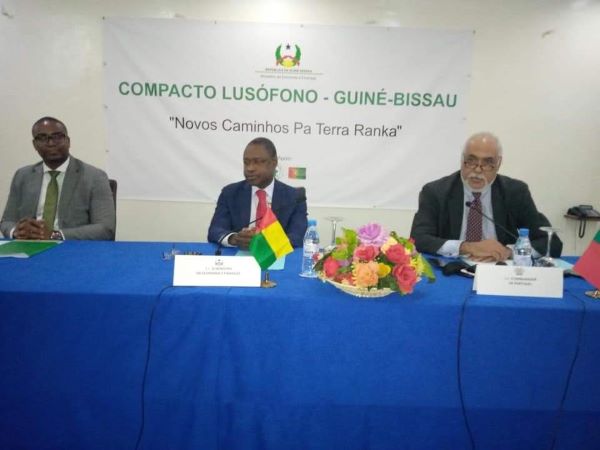
H.E. Minister of Economy and Finance of Guinea Bissau, Geraldo Martins (center), António de Carvalho, Amdassador of Portugal in Guinea Bissau (right) and Joel Muzima, Principal Country Economist of the AfDB
The African Development Bank presented the Lusophone Compact to the private sector in Guinea-Bissau last month, during an event at the national Economic Forum.
The Lusophone Compact, a financing platform involving the African Development Bank, Portugal, and the six Portuguese-speaking countries of Africa (PALOPs), provides risk mitigation, investment products and technical assistance to accelerate private sector development in Lusophone African countries (Angola, Cabo Verde, Equatorial Guinea, Guinea-Bissau, Mozambique and Sao Tome and Principe).
About 100 participants, including government representatives, international partners, local and foreign investors, attended the government-sponsored event, which was also attended by Guinea-Bissau Minister of Economy and Finance Geraldo Martins, and Antonio de Carvalho, Portuguese Ambassador to Guinea Bissau.
Opening the session, Martins described the occasion as “an important event to ensure that local stakeholders have a full understanding of the tools available.” He told attendees that the event followed the signing of the Lusophone Compact on 26 July 2019, in the presence of Teresa Ribeiro, Secretary of State for Foreign Affairs and Cooperation of Portugal.
Ambassor de Carvalho, highlighted the importance of the Compact to strengthen the Lusophone cooperation in Africa, mentioning the commercial and risk mitigation garantees to be offered by Portugal.
Joel Muzima, Bank principal country economist for the Bank, highlighted the positive partnership between the Bank and the Government of Guinea-Bissaua, reflected by the growing portfolio in areas of governance, agriculture and infrastructure development. He urged the private sector to present bankable projects to take advantage of the Lusophone Compact and leverage financial resources for development.
Projects eligible under the Compact are expected to align with the Bank’s development priorities, relevant country strategy papers and national development plans and involve the host country and at least two other Compact signatories. Focus will primary be on renewable energies, agribusiness and agricultural value chains, water and sanitation, infrastructures, tourism, financing and ICT.
There is also the provision for technical assistance projects to accelerate private sector and PPP growth. In Guinea-Bissau and elsewhere, project preparation has been identified as one of the main impediments to making projects bankable.








